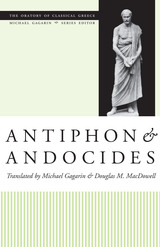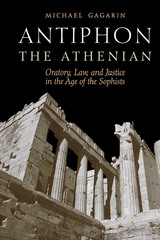
Classical oratory is an invaluable resource for the study of ancient Greek life and culture. The speeches offer evidence on Greek moral views, social and economic conditions, political and social ideology, and other aspects of Athenian culture that have been largely ignored: women and family life, slavery, and religion, to name just a few.
This volume contains the works of the two earliest surviving orators, Antiphon and Andocides. Antiphon (ca. 480-411) was a leading Athenian intellectual and creator of the profession of logography ("speech writing"), whose special interest was law and justice. His six surviving works all concern homicide cases. Andocides (ca. 440-390) was involved in two religious scandals—the mutilation of the Herms (busts of Hermes) and the revelation of the Eleusinian Mysteries—on the eve of the fateful Athenian expedition to Sicily in 415. His speeches are a defense against charges relating to those events.

Winner, Friends of the Dallas Public Library Award from the Texas Institute of Letters, 2003
Antiphon was a fifth-century Athenian intellectual (ca. 480-411 BCE) who created the profession of speechwriting while serving as an influential and highly sought-out adviser to litigants in the Athenian courts. Three of his speeches are preserved, together with three sets of Tetralogies (four hypothetical paired speeches), whose authenticity is sometimes doubted. Fragments also survive of intellectual treatises on subjects including justice, law, and nature (physis), which are often attributed to a separate Antiphon the Sophist. Were these two Antiphons really one and the same individual, endowed with a wide-ranging mind ready to tackle most of the diverse intellectual interests of his day?
Through an analysis of all these writings, this book convincingly argues that they were composed by a single individual, Antiphon the Athenian. Michael Gagarin sets close readings of individual works within a wider discussion of the fifth-century Athenian intellectual climate and the philosophical ferment known as the sophistic movement. This enables him to demonstrate the overall coherence of Antiphon's interests and writings and to show how he was a pivotal figure between the sophists and the Attic orators of the fourth century. In addition, Gagarin's argument allows us to reassess the work of the sophists as a whole, so that they can now be seen as primarily interested in logos (speech, argument) and as precursors of fourth-century rhetoric, rather than in their usual role as foils for Plato.

Two ill-fated rhetoricians.
Antiphon of Athens, born in 480 BC, spent his prime in the great period of Athens but, disliking democracy, was himself an ardent oligarch who with others set up a violent short-lived oligarchy in 411. The restored democracy executed him for treason. He had been a writer of speeches for other people involved in litigation. Of the fifteen surviving works three concern real murder cases. The others are exercises in speechcraft consisting of three tetralogies, each tetralogy comprising four skeleton speeches: accuser’s; defendant’s; accuser’s reply; defendant’s counter-reply.
Andocides of Athens, born ca. 440 BC, disliked the extremes of both democracy and oligarchy. Involved in religious scandal in 415 BC, he went into exile. After at least two efforts to return, he did so under the amnesty of 403. In 399 he was acquitted on a charge of profaning the Mysteries and in 391–390 took part in an abortive peace embassy to Sparta. Extant speeches are: On His Return (a plea on his second attempt); On the Mysteries (a self-defense); On the Peace with Sparta. The speech Against Alcibiades (the notorious politician) is suspect.
READERS
Browse our collection.
PUBLISHERS
See BiblioVault's publisher services.
STUDENT SERVICES
Files for college accessibility offices.
UChicago Accessibility Resources
home | accessibility | search | about | contact us
BiblioVault ® 2001 - 2024
The University of Chicago Press









